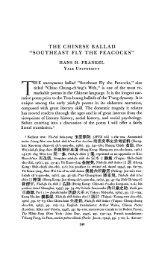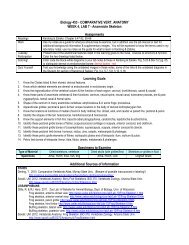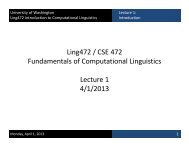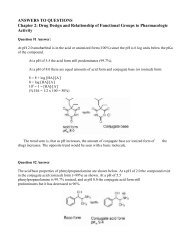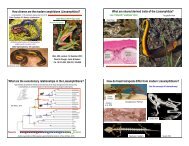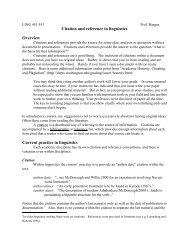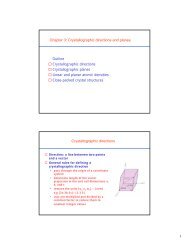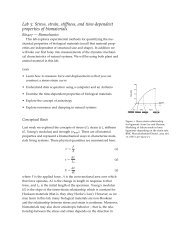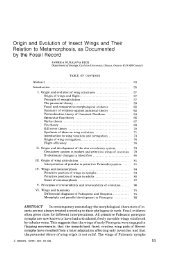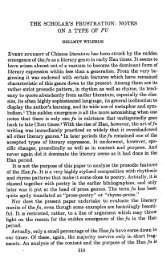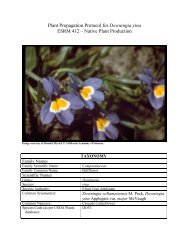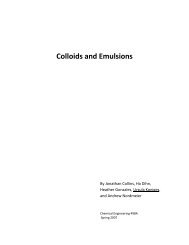Fundamentals of Grammar - Adverbs - University of Washington
Fundamentals of Grammar - Adverbs - University of Washington
Fundamentals of Grammar - Adverbs - University of Washington
Create successful ePaper yourself
Turn your PDF publications into a flip-book with our unique Google optimized e-Paper software.
<strong>Fundamentals</strong> <strong>of</strong> <strong>Grammar</strong><br />
<strong>Adverbs</strong><br />
Joshua Crowgey<br />
Ling 100<br />
Department <strong>of</strong> Linguistics<br />
<strong>University</strong> <strong>of</strong> <strong>Washington</strong><br />
3 July 2012
today<br />
content<br />
▶ semantics <strong>of</strong> adverbs<br />
▶ morphology <strong>of</strong> adverbs<br />
▶ derivational vs inflectional<br />
▶ flat adverbs<br />
reminder<br />
▶ no class tomorrow<br />
▶ hw5 due tomorrow night 23:59<br />
▶ hw6 available tomorrow, due Friday
semantics <strong>of</strong> adverbs<br />
<strong>Adverbs</strong> modify verbs and sentences, adding information<br />
about events and states including<br />
▶ possibility<br />
▶ attitude<br />
▶ time<br />
▶ aspect<br />
▶ frequency<br />
▶ manner<br />
▶ place<br />
▶ focus
semantics <strong>of</strong> adverbs<br />
possiblity<br />
Information about the likelihood <strong>of</strong> an event’s truth value.<br />
▶ They will definitely finish the broccoli.<br />
▶ Sam has undoubtedly left.<br />
attitude<br />
Conveys the speaker’s attitude towards the proposition<br />
expressed by the sentence.<br />
▶ Conveniently, we heard the alarm.<br />
▶ Regretfully, she’s better at chess than me.
semantics <strong>of</strong> adverbs<br />
Adv can convey semantic tense and aspect<br />
time<br />
Answers the question when?<br />
▶ Tomorrow we leave for Paris!<br />
▶ Y’all should leave now.<br />
aspect<br />
Duration, completion, habitual action.<br />
▶ Kim continually crashes the ship.<br />
▶ Dana has not done so yet.
semantics <strong>of</strong> adverbs<br />
frequency<br />
Answers the question how <strong>of</strong>ten?<br />
▶ That DVD is occasionally checked out.<br />
▶ I rarely get my way.<br />
manner<br />
Answers the question how?<br />
▶ They cut the cake swiftly.<br />
▶ Walk s<strong>of</strong>tly and carry a big stick.
semantics <strong>of</strong> adverbs<br />
place<br />
Location or direction; answers the question where?<br />
▶ The boy pointed here/there/everywhere.<br />
▶ They all moved westward.<br />
focus<br />
The element indicated is semantically highlighted.<br />
▶ Even Chris came to the party.<br />
▶ Kim came, too.<br />
▶ I would only come if Chris didn’t.
practice<br />
She drove recklessly.<br />
Thankfully, I didn’t have to go to court.<br />
Lee also when to see the show.<br />
Marnie read the book twice.<br />
I will absolutely sue you.<br />
She walked downstairs.<br />
The baby is still sleeping<br />
manner<br />
attitude<br />
focus<br />
frequency<br />
possibility<br />
place<br />
aspect
morphology <strong>of</strong> adverbs<br />
derivational morphology<br />
<strong>Adverbs</strong> can be created from adjectives by the derviational<br />
suffix -ly.<br />
▶ serious + ly → seriously<br />
▶ effortless + ly → effortlessly<br />
▶ proud + ly → proudly<br />
▶ quiet + ly → quietly
morphology <strong>of</strong> adverbs<br />
But there are adjectives that end in -ly too!<br />
▶ the friendly boy<br />
▶ a lovely poem<br />
▶ the lonely hermit<br />
▶ some deadly person<br />
▶ an ugly duckling<br />
▶ that silly goose
morphology <strong>of</strong> adverbs<br />
derivational morphology<br />
Other affixes also derive adverbs:<br />
▶ -wise: likewise, lengthwise<br />
▶ -ward: onward, downward<br />
▶ -ways: sideways, crossways<br />
▶ -ally, basically, tragically, manically<br />
NB: phonological condition here (-ic)
morphology <strong>of</strong> adverbs<br />
flat adverbs<br />
Some adverbs are not morphologically marked by a<br />
productive derivational rule.<br />
▶ You don’t play fair.<br />
▶ The car drove fast.<br />
▶ The boy bit the cookie hard.<br />
▶ The bird flew high/low in the sky.<br />
▶ The train arrived late/early.
morphology <strong>of</strong> adverbs<br />
flat adverbs<br />
Note: these same words can be adjectives (adverbs derived<br />
by conversion).<br />
▶ That was a fair play.<br />
▶ The fast car sped by.<br />
▶ The cookie was too hard.<br />
▶ The selling price was too high/low for me.<br />
▶ We took the late/early train.
practice<br />
Adj or Adv?:<br />
Let’s play a quick game.<br />
I never saw him run so quick.<br />
We need to catch the train early.<br />
We need to catch the early train.<br />
Hold the bear tight.<br />
Make the screw tight.<br />
adj<br />
adv<br />
adv<br />
adj<br />
adv<br />
adj
morphology <strong>of</strong> adverbs<br />
inflectional morphology<br />
Like Adj, adverbs can be inflected for degree <strong>of</strong> comparisoin<br />
with -er/-est<br />
▶ Cheetahs run fast.<br />
▶ Cheetahs run faster than lions.<br />
▶ Cheetahs run fastest <strong>of</strong> all the big cats.<br />
Note: use more/most, less/least with -ly adverbs (eg:<br />
Cheetahs run more quickly/*quicklier than tigers.)<br />
Contrast this with -ly adjectives which can use -er/-est: Linus<br />
is friendlier/uglier than Schroeder.
practice<br />
Adj or Adv?:<br />
That is a kingly gift.<br />
He runs daily.<br />
We should leave early.<br />
That is not a very likely scenario.<br />
He will likely leave at 6:00.<br />
She made a costly mistake.<br />
adj<br />
adv<br />
adv<br />
adj<br />
adv<br />
adj



